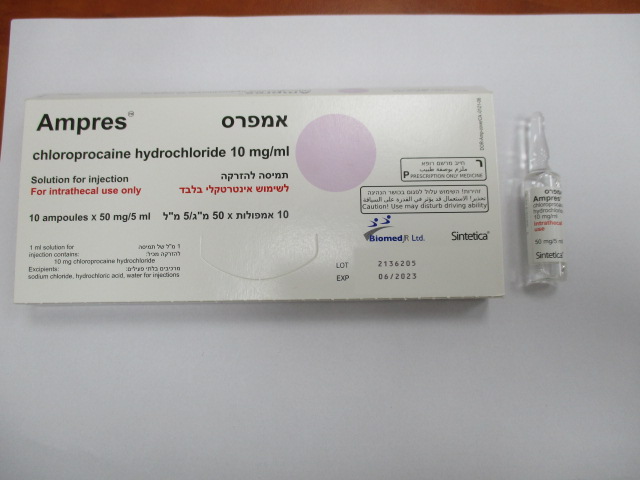Quest for the right Drug

אמפרס AMPRES (CHLOROPROCAINE HYDROCHLORIDE)
תרופה במרשם
תרופה בסל
נרקוטיקה
ציטוטוקסיקה
צורת מתן:
תוך-שדרתי : INTRATHECAL
צורת מינון:
תמיסה להזרקה : SOLUTION FOR INJECTION
עלון לרופא
מינוניםPosology התוויות
Indications תופעות לוואי
Adverse reactions התוויות נגד
Contraindications אינטראקציות
Interactions מינון יתר
Overdose הריון/הנקה
Pregnancy & Lactation אוכלוסיות מיוחדות
Special populations תכונות פרמקולוגיות
Pharmacological properties מידע רוקחי
Pharmaceutical particulars אזהרת שימוש
Special Warning עלון לרופא
Physicians Leaflet
Adverse reactions : תופעות לוואי
4.8 Undesirable effects Summary of safety profile The possible undesirable effects due to the use of Ampres are generally similar to the undesirable effects of other local anaesthetics for spinal anaesthesia from the ester group. The undesirable effects induced by the medicinal product are difficult to distinguish from the physiological effects of the nerve block (e.g. reduction in arterial pressure, bradycardia, temporary urine retention), from direct effects (e.g. spinal hematoma) or the indirect effects (e.g. meningitis) of the injection or from the effects due to the loss of cerebrospinal liquid (e.g. post-spinal headache). Tabulated summary of adverse reactions The adverse reactions listed below in Table 1 are classified according to System Organ Class. The frequency of undesirable effects listed below is defined using the following convention: Very common (≥1/10), Common (≥1/100 to <1/10), Uncommon (≥1/1,000 to <1/100), Rare (≥1/10,000 to <1/1,000), Very rare (<1/10,000), Not known (cannot be estimated from the available data). Very common Common Uncommon Rare Very Rare Immune system disorders allergic reactions as a result of sensitivity to the local anaesthetic: characterized by signs such as urticaria, pruritus, erythema, angioneurotic edema with possible airway obstruction (including laryngeal edema), tachycardia, sneezing, nausea, vomiting, dizziness, syncope, excessive sweating, elevated temperature, and possibly, anaphylactoid type symptomatology (including severe hypotension) Injury, Poisoning and Procedural Complications anesthetic complication. Nervous system disorders anxiety, signs and symptoms neuropathy, drowsiness restlessness, of CNS toxicity merging into paresthesia, (backache, headache, unconsciousness and dizziness tremors possibly respiratory arrest, spinal proceeding to block of varying magnitude convulsions, (including total spinal convulsions, block), hypotension circumoral secondary to spinal block, paresthesia, feeling of loss of bladder and bowel numbness affecting control, and loss of perineal the tongue, hearing sensation and sexual problems, visual function, arachnoiditis, problems, blurred persistent motor, sensory vision, shaking, and/or autonomic (sphincter tinnitus, speech control) deficit of some problems, loss of lower spinal segments with consciousness). slow recovery (several months,). cauda equina syndrome and permanent neurological injury. Eye disorders diplopia Cardiac disorders arrhythmia, depression of the myocardium, cardiac arrest (the risk is increased by high doses or unintended intravascular injection). Vascular disorders hypotension. bradycardia, hypertension, hypotension raised by high doses. Respiratory, thoracic and mediastinal disorders respiratory depression Gastrointestinal disorders nausea. vomiting. Reporting of suspected adverse reactions Reporting suspected adverse reactions after authorisation of the medicinal product is important. It allows continued monitoring of the benefit/risk balance of the medicinal product. Any suspected adverse events should be reported to the Ministry of Health according to the National Regulation by using an online form https://sideeffects.health.gov.il.

שימוש לפי פנקס קופ''ח כללית 1994
לא צוין
תאריך הכללה מקורי בסל
לא צוין
הגבלות
לא צוין
מידע נוסף
